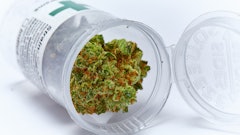
Demand for medical cannabis in Arkansas reached an all-time high in 2024, but the state’s 37 licensed dispensaries did not reap the rewards of moving more product across the counter.
That’s because, despite qualified patients purchasing a greater volume of cannabis in 2024, they spent a total of $275.9 million for their products, representing a 2.5% dip compared to the $283 million spent in 2023, according to the state’s Department of Finance and Administration (DFA).
Getting more bang for their buck in 2024, Arkansas’ roughly 110,000 active patients purchased 75,598 pounds of cannabis, or 21.5% more than the 62,227 pounds they bought in 2023, according to the DFA.
“Lower prices were a key reason for the increase,” DFA spokesperson Scott Hardin said in a media release.
Arkansas concluded 2024 with more than $24 million in medical cannabis sales, with 6,721 pounds sold in December. The state’s dispensaries have recorded more than $1.3 billion since the first store opened in May 2019, according to DFA.
The state collected more than $31 million in tax revenue from the cannabis industry in 2024, including nearly $16 million on Arkansas’ 6.5% sales tax on retail and cultivation sales and $15.2 million on the state’s 4% “privilege tax” on sales made from a cultivator to a dispensary, according to the DFA.
Since the program launched in 2019, medical cannabis dispensaries have generated roughly $150 million in state tax revenue.
Suite 443, the state’s first dispensary, led Arkansas with 730 pounds of medical cannabis sold in December from its Hot Springs location, while Natural Relief in Sherwood sold 547 pounds in December, and CROP in Jonesboro sold 419 pounds, according to DFA. Eleven of the state’s 37 dispensaries reported fewer than 100 pounds sold for the month.
While cannabis activists from Arkansans for Patient Access (APA) attempted to expand the state’s medical cannabis program through a citizen-initiated ballot measure in 2024, the state’s Supreme Court ruled in a 4-3 decision in October that the ballot title for a proposed amendment was misleading and therefore election results for the measure would not count.
The ballot measure, Issue 3, proposed expanding Arkansas’ existing program by increasing the number of qualifying conditions, allowing additional types of health care professionals to certify patients, and enabling patients to grow cannabis at home, among other provisions.



























